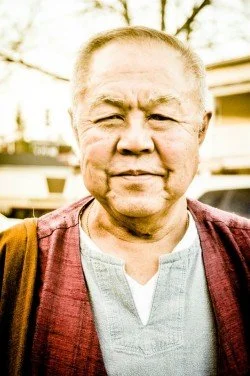We Believe
Spiritual practice is not a substitute for political work.
"Needless to say, meditation alone, which brings about critical reflection, humility, and simplicity, is insufficient to counter the power of foreign capital."
—Ajahn Sulak Sivaraksa
No amount of meditation, mindfulness, or even devotional practice is going to automatically tear down the fearsome structures of oppression. As the deeply fierce and courageous Civil Rights organizer Fannie Lou Hamer put it, coming from a Black Southern Christian tradition: "You can pray until you faint, but if you don’t get up and try to do something, God is not going to put it in your lap."
Or, as the Buddha put it: our hopes and prayers can't cause butter to sink or stones to float, just as they can't alter the consequences of our wholesome or unwholesome actions.
On a collective level, we take this to mean: our duty is not just to hope for, but to commit to collective liberation. To transform structures like racism, sexism, colonization, war, ableism, transphobia, poverty, and ecological destruction. For us, social justice work can be a beautiful expression of what the Buddha called Right Action. Not the only expression; not one we do perfectly, or even uniformly. But an expression we are choosing. A path we keep choosing, day by day.
AND — Political work is not a substitute for spiritual practice, either.
"When I get desperate, which is pretty often, I ask myself how to not be overwhelmed by despair or cynicism. For my own sake, for my family, and for my sangha, I need to vow to not burn out."
—Mushim Ikeda
As many of us who've experienced burnout can testify, even meaningful justice work can be incredibly brittle and toxic unless we also attend to the nature of suffering.
Just like we encourage all BPFers to plug into social movements, we encourage all BPFers to pursue a spiritually grounded practice in some form — whether that's mindfulness meditation, Buddhism with a teacher or community, or another religious path. We are exceedingly honored to share wisdom from Buddhist teachers and peers, addressing timely, relevant questions for people engaged (or enraged!) in the world of social change.
We acknowledge that none of the work of BPF, or any Buddhist organization, would be possible without the passing down of Dharma through generations and generations (more than 2,600 years) of lineage holders throughout South Asia, East Asia, Southeast Asia, and worldwide throughout the Asian Buddhist Diaspora. In a white-dominant U.S. political climate that is quick to erase or minimize the contributions of Asian American and Asian Diasporic Buddhists to Buddhadharma in this country, we feel it's especially important to untangle, with love, the karma of this troubling trend.
Specifically, Buddhist Peace Fellowship is historically indebted to Buddhist teachers and activists including (but not limited to):
Ven. Thích Nhất Hạnh
Shunryu Suzuki Roshi
The Imamura Family
Mayumi Oda
Mushim Ikeda
Ajahn Sulak Sivaraksa
Why do people come to BPF?
Most folks who gravitate toward BPF are committed to social change in some way — whether new to activism or already cycled through countless rounds of burnout. We're here to help you pursue your own unique role in political movements, in the best way you can. In a friendly yet serious atmosphere, we offer:
basic political education
freely accessible media
trainings in nonviolent direct action (applicable in a wide range of justice struggles)
a place to draw connections between spiritual and political liberation.
In these ways and more, BPF aims to be a good friend to social movements. Along the way, we create living laboratories for combining our dharma practice and social justice principles, to foster the kind of community we wish to see in the world.[divide]
Loving the world as it is, and fighting like hell to change it.
"It is not enough to use our meditation practices to calm our nerves or quiet our children. We must use our developing capacities to see who we are as a people and discover our place in easing the suffering in the world."
—Rev. Zenju Earthlyn Manuel
BPF is not one lineage, not one doctrine, not one issue-based campaign. Although we seek guidance from teachers in various traditions, we are not currently led by ordained or empowered teachers in any lineage of Buddhism. Instead, we are a diverse community of people devoted and indebted to the Buddha's wisdom teachings. Check out our Board and Staff Bios to learn more about the personal practice of individual BPFers steering the ship these days.Whether you've received transmission as a lineage holder, or just enrolled in your first mindfulness class through your local health clinic, we're so glad you're here with us, caring for both Buddhadharma and social justice.Existing in this Venn Diagram of Buddhism and social justice, right in the incredibly rich middle, is a deep honor and responsibility. We are privileged and humbled to share this portion of the path with committed people like you! Acknowledging that we will inevitably mess up, we are grateful for the chance to learn and grow, doing our best in service of collective liberation.


